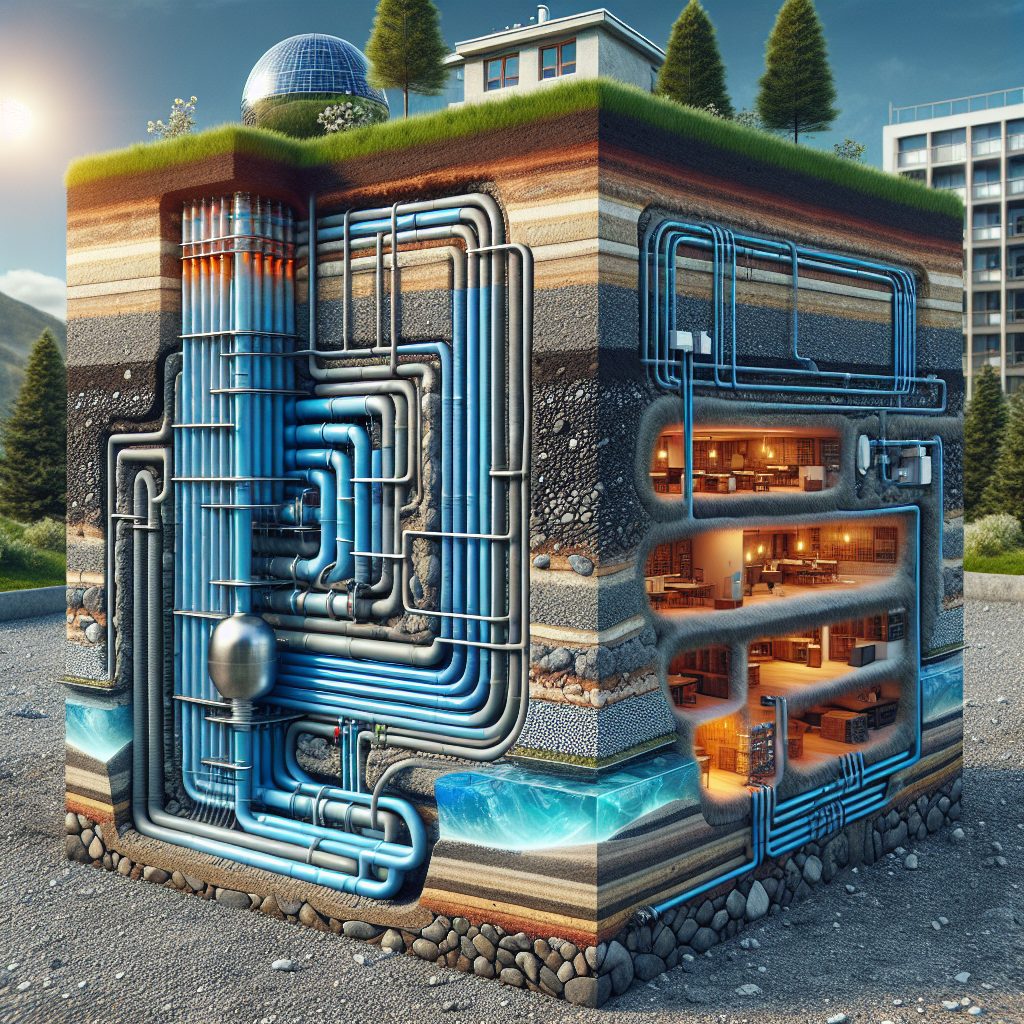
Geothermal heating and cooling is an energy efficient, eco-friendly method for heating and cooling buildings. It taps into the Earth’s natural heat by installing pipes below the ground that transfer the heat or cold in and out of the structure. This renewable energy harnesses the natural entropy of the Earth to provide a year-round stable temperature in the living space. Typically, one system is capable of both heating and cooling, which reduces the need for additional energy sources such as air conditioning units or space heaters. In addition, geothermal heating and cooling is cost effective due to its lower energy costs and strength of component design – a typical system can last up to 50 years.
One key benefit of geothermal heating and cooling is that it reduces the amount of fossil fuels burnt, therefore cutting down on carbon emissions that contribute to climate change. Furthermore, it is also maintenance free, as the geothermal system is located underground, requiring minimal upkeep to keep running smoothly. For instance, no air filters need to be replaced periodically, resulting in less downtime and fewer costs associated with repairs. Geothermal heating and cooling systems are also quieter than other systems, and can be installed with minimum disruption to an existing property. In the next part of this article, we will explore the different construction site considerations for geothermal heating and cooling installations.
Key Takeaways
1. Geothermal systems are a form of renewable energy that use the heat beneath the Earth’s surface to condition buildings.
2. The system consists of an indoor unit that provides heating and cooling, and a buried loop of piping filled with water and an antifreeze solution, located beneath the surface of the ground.
3. Geothermal systems can reduce the use of fossil fuels and they can save 40-60% on utility bills compared with traditional heating and cooling systems.
4. Homeowners would need to take into account the upfront cost ensuring that the system will be worth the investment for a longer period of time.
5. Maintenance of geothermal systems is relatively easy, as only occasional inspections by a professional are necessary, and the underground loop system is expected to last for more than 50 years.
What is Geothermal Heating and Cooling?
Geothermal heating and cooling is the process of using the natural heat of the Earth’s surface to provide heating and cooling in a residential or commercial space. This process is often accomplished using a geothermal heat pump (GHP), which utilizes underground pipes buried deep in the Earth to collect and store heat energy to provide heating and cooling in a home or business.
How Does Geothermal Heating and Cooling Work?
Geothermal heating and cooling of a home or business is an efficient and environmentally-friendly way of cooling and heating a space. Through the use of an underground loop system, a geothermal heat pump absorbs heat from the Earth’s surface in the winter months and transfers that heat energy into a building’s interior. During the summer months, the geothermal heat pump will extract heat energy from the home or business and send it deep underground to be absorbed by the Earth.
What are the Benefits of Geothermal Heating and Cooling?
Though the initial cost of installing a geothermal heat pump can be more costly than traditional heating and cooling units, the long-term benefits significantly outweigh the initial cost. Geothermal heating and cooling systems are known for their longevity, with some systems lasting up to 50-years and needing minimal maintenance throughout their lifetime, which helps to lower the overall cost of ownership. Additionally, since geothermal heating and cooling systems do not rely on external energy sources, they are known to significantly lower energy bills and provide homes or businesses with cost savings of up to 70%.
What Other Advantages Does Geothermal Heating and Cooling Offer?
Not only is geothermal heating and cooling an effective and cost-efficient way of tempering a space, but the system itself is also known to be extremely safe for the environment. Since this process does not depend on burning fossil fuels, it does not contribute to air pollution like traditional heating and cooling systems. As an added bonus, geothermal systems are extremely quiet, and since they are buried beneath the ground, there is no need for outdoor units that may be eyesores to some.
Are There Any Potential Disadvantages of Geothermal Heating and Cooling?
Though geothermal heating and cooling systems provide a plethora of advantages, the installation process can be costly and time-consuming. Depending on the individual needs of the home or business owner, the installation process can take several days before the system is operational. Additionally, since geothermal systems are buried beneath the Earth, there is always the chance of them being damaged due to ground shifting or major storms.
How Can I Choose the Right Geothermal Heating and Cooling System?
When choosing the right geothermal heating and cooling system, the size of the space to be heated and cooled must be considered. Additionally, factors such as the soil type and climate conditions must be taken into account, as these can affect the efficiency of the system. It is recommended to speak with a professional to determine the best system for the individual needs of the home or business owner.
What Are the Most Important Things to Know Before Purchasing a Geothermal Heating and Cooling System?
When considering the purchase of a geothermal heating and cooling system, there are several factors to consider such as the purchase cost, installation cost, and ongoing operating costs. Additionally, understanding exactly how the system works and how it affects the environment is important in making an informed decision.
10 Tips for Choosing the Right Geothermal Heating and Cooling System:
1. Determine your heating and cooling needs.
2. Understand the environmental benefits of geothermal heating and cooling.
3. Find a reputable geothermal heat pump contractor.
4. Ensure the contractor is familiar with local building codes and regulations.
5. Request a professional evaluation to determine the best system for your needs.
6. Make sure the contractor tests the soil.
7. Compare the purchase cost as well as the installation and operating costs.
8. Explore potential tax rebates and other incentives.
9. Ask about warranties, maintenance, and service contracts.
10. Check the contractor’s references.
What is geothermal heating and cooling?
Geothermal heating and cooling, also known as a ground source heat pump, is a system that involves taking energy from or sending energy into the ground. To help cool your home, the system extracts energy stored in the earth by using a loop of special piping connected to your geothermal heat pump, and to help heat your home, the system sends energy into the ground.
What are the benefits of geothermal heating and cooling?
Geothermal heating and cooling systems offer several advantages. They are energy efficient, have low operating costs, require minimal maintenance, and are environmentally friendly. Geothermal systems can also provide consistent temperatures year-round, often at a lower cost than a traditional heating and cooling system.
How does a geothermal system work?
Geothermal systems use liquid-filled pipes buried in the ground to transfer heat energy into or out of the home, depending on the season. During summer months, the system absorbs heat from the home and transfers it into the ground. In winter, the system absorbs and transfers heat from the ground into the home.
Where can I install a geothermal system?
Geothermal systems can be installed in almost any type of home or commercial building. However, the location of the geothermal heat pump may vary depending on the type of system and home. The ideal location for a geothermal system is an area with adequate soil and enough space for the pipes.
How much does a geothermal system cost?
The cost of a geothermal system will vary depending on the size of the home and the type of system being installed. Generally, geothermal systems cost more up-front than traditional systems, but they offer long-term savings due to their energy efficiency and low operating costs.
Is a geothermal system noisy?
No, geothermal systems are much quieter than traditional heating and cooling systems. Since the heat pump is installed inside the home, you will only hear a low hum during operation.
Do geothermal systems require a lot of maintenance?
No, geothermal systems require very little maintenance. Most of the maintenance involves inspecting and servicing the inside components of the geothermal heat pump, such as the evaporator and condenser coils, as well as any air filters.
Are geothermal systems safe?
Yes, geothermal systems are generally considered to be safe. The system components are installed in the ground, but the heat pumps are installed indoors, away from moving parts or other hazardous materials. Also, since geothermal systems operate on electricity, there is no risk of carbon monoxide poisoning.
Do geothermal systems last longer than traditional systems?
Yes, geothermal systems tend to last longer than traditional systems due to their low operating costs and low maintenance requirements. Generally, a geothermal system can last up to 25 years or more with proper maintenance.
Are geothermal systems eligible for rebates and tax credits?
Yes, many state and federal governments offer rebates and tax credits for homeowners who install a geothermal system. Be sure to check with your local utility company to see what incentives are available in your area.
Final Thoughts
Geothermal heating and cooling is an excellent option for homeowners who are looking for an energy-efficient and cost-effective solution for climate control. Not only do geothermal systems offer long-term savings compared to traditional systems, but they are also environmentally friendly and require minimal maintenance. If you are looking for an alternative to traditional heating and cooling systems, consider the benefits of a geothermal system for your home.
It is important to remember, however, that installing a geothermal system is an investment and requires professional installation. Before making any decisions, consult with a qualified contractor for the best advice on your specific needs and budget.



